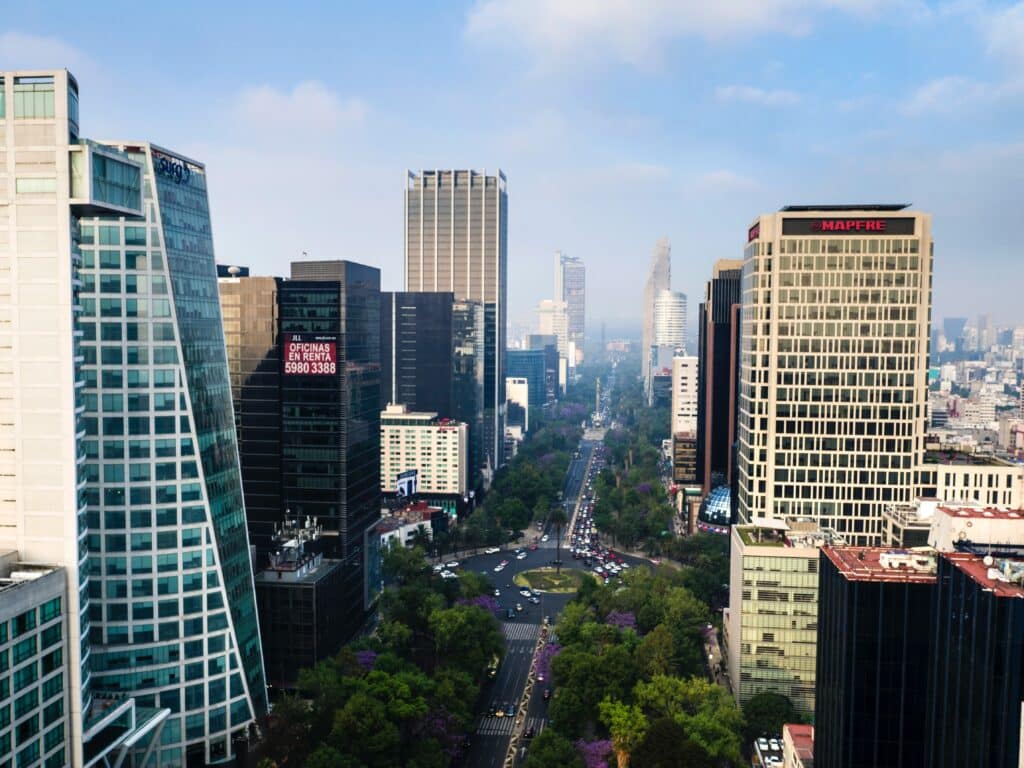
Whether you’re considering moving or simply seeking new investments, purchasing property is a big step in life. While buying property in your own country comes with its own complexities, purchasing property in a different country comes with its own processes that can be confusing for even the most experienced homebuyer.
Mexico has become an increasingly popular country for property investors and homebuyers from other countries. That naturally requires transferring money to or from Mexico. Remitly can streamline the process of converting and transferring pesos safely, easily, and reliably. Read on to learn more about buying property for sale in Mexico.
Why buy property in Mexico?
The simple answer: why not? Mexico is a beautiful place, full of amazing sights, sounds, foods, and attractions rooted in history and diverse cultures. Whether you’re moving to Mexico or looking for new investments, it’s a country that has a little something for everyone.
Mexico is particularly appealing to people living in the U.S. and Canada thanks to its proximity. The country is also familiar, especially if you’ve ever been to California or Texas.
Buying real estate in Mexico presents financial benefits as well. Euros and US dollars have favorable exchange rates for pesos. Combine that with Mexico’s lower cost of living, and you can live in Mexico for less.
Can foreigners buy property in Mexico?
You do not need to seek citizenship in Mexico to own property there, though it doesn’t hurt if you want to be a Mexican citizen.
However, owning property as a foreigner does come with some guidelines and restrictions. The thing that you have to consider is restricted zones. Foreign individuals and companies aren’t allowed to own land within 100 km (61 miles) of the international border and 50 km (31 miles) of the coast.
Foreigners can buy a house in Mexico in the restricted zone but only through a trust fund for 50 years. This trust, known as a fideicomiso, is managed by a bank, and any decisions you make on the property have to go through the bank.
What’s the real estate market like in Mexico?
Property prices in Mexico have been increasing steadily over the past decade. As of May 2023, Mexicos’ Federal Mortgage Society reports that home prices are up 11.7% on average compared to 2022. The average cost for a home is about 1.6 million pesos (about U.S. $93,414).
All real estate markets will fluctuate based on a whole host of economic, political, and cultural factors out of your control. Mexico’s real estate market is no different, so you might experience higher or lower prices when researching houses for sale in Mexico.
What are the legal requirements for buying real estate in Mexico?
Legal requirements for buying land for sale in Mexico are relatively similar to those in most other countries. The main difference is the notary. Unlike in the U.S., U.K., France, and other countries, the state governor appoints notaries in Mexico.
Notaries are meant specifically to represent you, not the seller, throughout the entire process. They will handle everything, from paperwork to recording the new title.
Legally, all official documents, including the contract and closing documents, must be in Spanish. Most realtors will provide a version in English, and you can translate the official documents into your most fluent language. However, make sure that the translation matches.
How much is a house in Mexico?

The actual, final cost of your home in Mexico will vary based on numerous factors, including the property’s location, size, and age. If you’re financing, your credit score can also affect the final cost.
The cost technically starts with discovery visits as you travel through the country and look at houses in Mexico for sale, so factor the travel price into the total cost. Other costs include:
- Property valuation reports: US $200-300
- Closing costs: 5-10% of sale value
- Property acquisition tax: 2-5% of property value
- Annual property tax (predial): a low amount based on the size and location of the property
- Setting up a fideicomiso: US $1,000
- Ongoing fideicomiso fees: US $500-$2,000 per year
Home insurance is another extra cost, but your total home insurance will depend on the policy provider and your property’s characteristics.
Where is the best place to buy Mexico real estate?
Where you choose to buy your property in Mexico largely depends on what you want or need from the area. Do you enjoy a quiet, rural getaway, or do you want to be directly in the hustle and bustle of a busy city?
The good news is that there isn’t really a wrong decision, but here are some popular cities to help you get started.
Mexico City
Mexico City is the nation’s capital and has a little something for everyone. It’s a busy, central city with business districts, art scenes, dining, and entertainment all in one. Neighborhoods in Mexico City vary in their daily pace and property values, though popular areas for foreigners include:
- Roma
- Condesa
- Coyoacán
- San Ángel
Puebla
A couple of hours southeast of Mexico City, Puebla is the fourth largest city (and fourth largest Metropolitan area) in the country. More modern metropolitan elements combine old churches and colonial buildings from the 16th and 17th centuries, creating an interesting combination of new and old world styles.
The growing culture and the proximity to Mexico City make Puebla an enticing city for investors and homebuyers.
Playa del Carmen
Located about 40 miles north of Tulum, Playa del Carmen is a growing city that’s similar in atmosphere to Cancun. If you’re looking at houses for sale in Cancun, Mexico, Playa del Carmen is considered a better alternative to Cancun’s busier, more tourist-centric metropolis. While still hosting plenty of tourists, Playa del Carmen has a distinctly relaxed atmosphere that still takes full advantage of the beautiful sun and beachside views.
If you’re looking at homes for sale in Mexico, you might have better luck finding a property in Playa del Carmen than in Tulum. Larger resorts and hotels mostly occupy Tulum’s beachfront properties, while Playa del Carmen offers plenty of residential properties still on the beach.

Mérida
The capital of Yucatán, Mérida boasts colorful architecture rooted in Mayan culture and colonial history. Mérida has consistently been ranked as one of the safest cities in Mexico (and in all of the Americas), and it is just an hour away from the beaches along the Gulf of Mexico. This makes it a prime city to find homes and ranches for sale in Mexico.
Monterrey
Monterrey is the capital of Nuevo Léon, a state occupying the northeastern portion of Mexico. The city’s proximity to the United States has made it a center of industry and business, and it hosts several regional offices for well-known international companies, including Dell, HTC, Boeing, Nokia, and General Electric.
Monterrey is also home to three universities: Universidad de Monterrey, Universidad Autónoma de Nuevo León, and Instituto Tecnológico y de Estudios Superiores de Monterrey. The surrounding mountains bring plenty of outdoor enthusiasts, while the historical architecture and museums make it a haven for curious-minded people.
How to find a real estate agent in Mexico
Finding a real estate agent in Mexico can come with hassles and confusing processes. Much of it can come down to searching online or asking friends with connections to real estate agents, but an agent is essential for navigating homes in Mexico and making the most informed decision.
If you’re having trouble, consider consulting AMPI (the Mexican Association of Real Estate Professionals). AMPI is a professional organization currently serving as the leading representative body for real estate practitioners in the country. The organization has strict regulations that require members to have licenses and pass certifications to deal with property in Mexico for sale.
If you don’t work with an AMPI-backed real estate agent, make sure you do find an agent with certifications and/or a license. Avoid uncertified agents, especially those who work independently.
Most importantly, ask questions. You are always better off having too much information than too little. Simple questions to ask include:
- How long have you been selling real estate in Mexico?
- How many clients have you had?
- How many successful sales have you closed?
The pitfalls of buying property in Mexico
Any pitfalls of buying a house in Mexico are similar to the pitfalls of buying property anywhere. This includes:
- Not finding an experienced real estate agent
- Purchasing a home that you’ve never seen in person
- Purchasing property in an area that you’ve never visited
- Forgetting to factor in any extra costs outside of the main sale price
- Not considering your long-term goals with that property
The steps to purchasing a property in Mexico
So you’ve visited Mexico, consulted a real estate agent, toured dozens of Mexican houses, and found the perfect piece of property to invest in or turn into your new home. What now?
- Talk to the seller and agree on a price that works for both of you.
- Work with your real estate agent to create a sales contract that includes the price and terms and conditions of the sale.
- Pay your deposit, which usually ranges from 5-10% of the sale price.
- If your home is within the restricted zone, you’ll have to create a fideicomiso. If the previous owner already has a fideicomiso, you can also arrange for a transfer to your name but note that the 50-year limit on it does not reset.
- At this point, your notary will take the necessary legal steps to complete the purchase. This will require you to sign documents stating that you must follow Mexican law should any issues arise with the property.
- Working with your notary, you’ll finish the valuation process and review the title.
- With all due diligence and valuation completed, you can now sign the escritura, which acts as the title to the property. You’ll pay all closing costs and taxes.
And with all that, you now own a piece of property in Mexico. Final registration will take about three months, but the property is officially yours.
Tips and resources for buying Mexican property
That’s a lot of information to take in, and every home sale will have its own nuances.
Lean on your notary. Remember that they are specifically there for you, so use their knowledge of the processes and systems to plan your steps.
Most importantly, ask questions. Buying a home in any situation can be confusing, but adding in a foreign language can complicate things. Misunderstandings could lead to financial (or even legal) issues, so always ask questions and reconfirm answers.
Some resources to help you:
- A consumer’s guide to buying real estate in Mexico from the Arizona Department of Real Estate
- Information about notary public services from the Mexican Secretariat of Foreign Affairs
- General guidelines and restrictions for owning property in Mexico